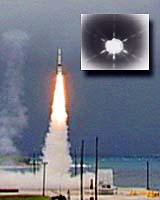| . |  |
. |
 Anti Missile Tests Delayed
Anti Missile Tests Delayedby Jim Mannion Washington (AFP) March 21, 2000 - The Pentagon on Tuesday postponed the next test of the US National Missile Defense system (NMD) until late June, pushing back to at least late summer a presidential decision on whether to have the controversial system deployed by 2005. The delay will mean that the Pentagon will have less time to review data from all the NMD tests before making a recommendation on the whether the system is ready for deployment, Air Force Lieutenant General Ronald Kadish acknowledged. Moreover, only 85 percent of the data from the upcoming test will have been analyzed in time for the Pentagon readiness review, which is now scheduled to be completed by the end of July, he said. But Kadish, director of the Ballistic Missile Defense Organization, told a news conference here that "We're not taking this to the point where we're doing things irrationally and rushing things unnecessarily." He said the flight test -- the third attempted interception of an intercontinental ballistic missile -- will be held on June 26 instead of April 26. A lot is riding on the 100-million-dollar test. The Pentagon has decided that before it can recommend deployment of the system, there should have been at least two successful "metal-on-metal tests." So far, there has only been one successful interception test -- the first one. In the second test, the system second narrowly missed when the interceptor's infrared seekers shut off in the final seconds. Kadish said experts have concluded the seekers failed because of a malfunction in their cooling system. Tiny orifices in pipes carrying krypton coolant were blocked when moisture in the gas froze, he said. New procedures have been devised to prevent moisture from getting into the gas during the next test, he added. "We have concluded that there is no major design or redesign activity that needs to occur prior to our next flight test," he said. Kadish said that the NMD program is still on schedule for potential deployment in 2005, despite the postponement of the third test. But if that schedule is to be met, President Bill Clinton must decide by November whether or not to go ahead with the deployment. Construction of radar bases in Alaska would have to begin by spring 2001, and contracts cannot be let until the president has given the project the final go-ahead. Clinton must make political calculations as well in making the deployment decision. George W. Bush, the likely Republican presidential candidate, has already vowed to develop an anti-missile defense system if elected president. Some Democrats worry that if Clinton decides before leaving office not to deploy the system, it will leave Vice President Al Gore, the Democratic nominee for the presidency, vulnerable to attack by political opponents if he succeeds Clinton in the White House. Other Democrats, however, have joined Republicans in urging Clinton to leave the decision to the president who will take office in January 2001. Those Democrats worry about the impact on arms control and relations with Russia of going ahead with the project. And Republicans fear Clinton might tie the hands of future presidents by striking a weak deal with Russia on changes to the 1972 Anti-Ballistic Missile Treaty. So far, Moscow has rebuffed US calls for changes to the treaty that would allow deployment of an initial phase of a NMD system, which would be designed to thwart a limited attack by relatively unsophisticated ballistic missiles. Clinton has said he will take into account the system's 38-billion-dollar lifetime cost, its technological feasibility and its international impact, as well as the threat posed by ballistic missiles in the hands of "rogue" states like North Korea and Iran.
Copyright 1999 AFP. All rights reserved. The material on this page is provided by AFP and may not be published, broadcast, rewritten or redistributed.
MILSPACE
|
| |||||||||
| The content herein, unless otherwise known to be public domain, are Copyright 1995-2016 - Space Media Network. All websites are published in Australia and are solely subject to Australian law and governed by Fair Use principals for news reporting and research purposes. AFP, UPI and IANS news wire stories are copyright Agence France-Presse, United Press International and Indo-Asia News Service. ESA news reports are copyright European Space Agency. All NASA sourced material is public domain. Additional copyrights may apply in whole or part to other bona fide parties. Advertising does not imply endorsement, agreement or approval of any opinions, statements or information provided by Space Media Network on any Web page published or hosted by Space Media Network. Privacy Statement All images and articles appearing on Space Media Network have been edited or digitally altered in some way. Any requests to remove copyright material will be acted upon in a timely and appropriate manner. Any attempt to extort money from Space Media Network will be ignored and reported to Australian Law Enforcement Agencies as a potential case of financial fraud involving the use of a telephonic carriage device or postal service. |